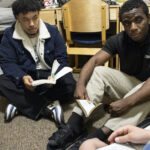
Anxiety is a state of uneasiness or nervousness usually over an impending or anticipated ill, according to Merriam-Webster. Many students may experience anxiety, especially as they grow closer to graduating and entering the unpredictable environment known as the world. About 42% of college students reported that they experience anxiety, according to a study by the American Psychological Association.
Willow Beach, sophomore double major in psychology and commercial performance, thinks that college students have a lot on their plates that contribute to feeling anxious.
“There’s so many new and continuous stressors in college like homework, personal relationships and jobs,” Beach said. “Additionally, there is the fear of the unknown when it comes to the future and the question of whether we are on the right path or not. And even though we are experiencing the same type of stressors as each other, we all still feel alone in managing them.”
Dr. Sam Welbaum, assistant professor of philosophy, agrees that feeling alone is a big factor of anxiety. He said he believes that contemporary society is more prone to loneliness due to our lack of connection with each other, something social media perpetuates too.
“Anxiety is worrying without an object,” Welbaum said. “It’s worry for worry’s sake. And a big cause of anxiety is isolation caused by a lack of community. Right now, our society is disconnected from each other, especially after the pandemic.”
However, Welbaum believes that Christianity can help provide a solution.
“As Christians, we have the opportunity to be part of the Christian community and the relationships that we can build within that community in turn helps with anxiety because we are part of a communal cluster,” Welbaum said.
One way to be involved in religious community is by attending church services. Research published in the International Journal of Depression and Anxiety (2019) concluded that in almost every study, faith, prayer and church-based social support were associated with reduced anxiety. There is also a correspondence in that “the higher the worship frequency, the lower the odds of depression and panic disorders,” according to findings on WebMD by researcher Marilyn Baetz.
Although research shows that anxiety can be reduced, there will always be the risk of an unforeseeable future. Welbaum said that not being able to predict our lives is part of the human experience, and as Christians, we can view this fact through a different lens.
“Christian perspective allows us to come to terms with the fact that we cannot predict the future and yet it also gives us the ability to be confident, content and joyful regardless because we know it will be for good,” Welbaum said.
Jeremiah 29:11 reads, “For I know the plans I have for you, declares the Lord, plans for welfare and not for evil, to give you a future and a hope.”
College students are mere humans and we have a lot to figure out on a daily basis. Even though it may take some time, there are ways for us to manage and to push past struggles such as dealing with anxiety, whether it be connecting with a friend or saying a prayer.


